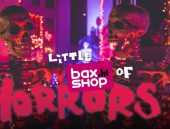Want Your Music to Pull More Attention? The Answer is ‘Positioning’
Published on Wednesday 12 February 2025

Struggling to expand your fanbase and have no idea what you need to be posting on Facebook and Instagram? Of course, you want more likes, more exposure and more gigs. You want your music to be pulling more attention, and you know that, to get that attention, you need to be more visible. But how?! The answer is ‘positioning’. Here, guest-blogger and musician Mirjam Sieben reveals the tips she used to help out the band Stompin’ Grounds.
Bored?
Positioning can form a really essential foundation on which to build some successful marketing for your music. Yes, the word does sound as boring and potentially annoying as any other marketing term you might pull from a college textbook, but if you have an understanding of it and know how to use it to your advantage, then you’ll soon realise that there is nothing boring or annoying about it at all.
Stompin’ Grounds
Stompin’ Grounds is one of the bands I’ve been helping to learn about the power of positioning. The lead vocalist and bassist, Jesse had a lot to say about what thinking about and implementing positioning has done for the band: “It’s actually helped us to make a clearer image of what we actually want to do as a band and how we want to be seen. Through the process, we also quickly discovered what works for us and what doesn’t and, thanks to that insight, we’re a lot more aware of what we’re doing and how that comes across to our audience.”
Sources of Inspiration
To start using positioning to your advantage, you need to play a little ‘let’s compare’ which is something that not every musician enjoys. “My work is totally unique and incomparable! It cannot be put in a box!” Of course not. But it’s simply smart to compare what you’re doing and what you want to do with what others are doing already. By using terms that have been used before, you give potential fans something that’s a little familiar – something that they immediately understand. Also, it’s just worth knowing what your potential audience is into already because it’ll only make it easier to pull them in. This kind of thing can also help inform your choices throughout the entire process, whether you’re making a social media post, promoting a gig, sending out emails or advertising on Facebook or Instagram.

Stompin’ Grounds (photo: Mitchell Giebels)
Thinking Inside the Box
“For people who think inside the box, the sound of Stompin’ Grounds is a lot like Pokey LaFarge meeting Triggerfinger. Bowties, winkle-picker shoes, braces and maybe a fifties TV somewhere in the background complete the picture,” wrote the online music journal 3voor12 about the band. The first sentence immediately confirms the fact that people (the press included) will always compare you with something that’s already out there. Admit it. It’s something you naturally do as well.
Get More Involved, Gain More Potential
“By researching the bands and artists that influence us the most, we also discovered a lot of music that was new to us,” Jesse continues. “It also gave us a broader perspective on what would best fit our music and our style. Previously, we’d always put ourselves in a really specific corner, but by looking deeper into where our music actually comes from, we suddenly saw endless possibilities, musically, visually and promotionally. We started by playing with what we showed of ourselves on social media and we noticed that the engagement of our fans started growing almost immediately.”
Genre & Niche
Ask yourself what you want to be and the kind of impact you want to make. Do you want to be a small fish in an expansive ocean, or a big fish in a small pond? If you want to have the most impact, you obviously want to be the last one. You want to make the most ripples – the most waves, rather than just riding the waves made by others. Being a big fish in a small pond will also make you stand out more, and make it less likely that another big fish will come along and swallow you up. To break with the analogy: you’re better off being a big name within a niche rather than a small name in a massive and overpopulated genre.
What’s a Niche?
According to Wikipedia, a niche is “a small and defined area of factors or conditions in which a specialisation can flourish.” So, in musical terms, that specialisation refers to a specific genre. Genres in general will have at least two layers to them: the main genre and the subgenre forms the upper layer, while niches and micro-niches form the second layer. Subgenres are more specific than the main genre, while a niche is a sort of specialisation within that subgenre and, with a micro-genre, you’re pin-pointing what makes your product so unique.
An Example of Genre & Niche
Jesse explains: “The genre, subgenre, the niche and micro-niche of Stompin’ Grounds runs as follows: Blues – Bluesrock – Texas Blues – Gypsy Blues. Having this structure clear in our heads has made us look closer at acts that come close to our style of music. So now we ask ourselves more and more questions like: what are they doing? How are they doing it? How are they showing it?”
One-liners
As a band or artist, you’re constantly asked to describe what your music sounds like and what people can expect. Having a nice and short one-liner (also known as an elevator pitch) handy can be really useful. Your one-liner should be a short message that you can easily share both online and offline. There’s really no need to tell a five minute story when people ask you what your band’s all about, but if you’ve never written a one-liner before, it can feel like an overwhelming job to have to condense all of your experiences and achievements into one line. But remember: you don’t have to say everything. The goal is to describe your music in as few words as possible so that people have an idea of what they’re in for and are invited to get curious about your work.
An Example of a One-liner
Your one-liner should mention your niche and/or micro-niche, two comparable artists, one or two of your ‘Unique Selling Points’ (so how you stand out from the rest of your niche), and maybe a couple of wild-cards, so words that describe your music or live shows. Jesse shares Stompin’ Grounds’ carefully constructed one-liner: “Three gentlemen that make you shake your butt, mixing the Stompin’ beats of Texas Blues with the virtuosity of Django Reinhardt’s Gypsy Swing!” The line appears on all of the band’s media channels. “If someone asks, we don’t literally recite it word for word, but we do always try to over-emphasise our energy, our vintage style and the non-western influences on our music and how danceable it is.”
What’s your ‘one-liner’? Let us know in the comments!
See also
» A 12-Step Guide to Making Low-Budget Music Videos
» Gig Fishing Do’s and Don’ts
» Album Artwork: Why Design Matters
» Live-Stream Your Gig with Great Sound!
» 10 Productive Tips for the At-Home-Musician
» Concert Photography – A Mini Course On How To Shoot Concert Photos
» Improving your music career with 5 daily habits
» The Professional Approach to DJ Shows
















No comments yet...